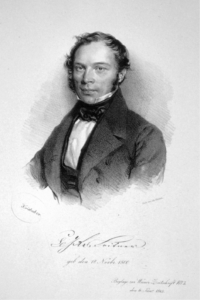Crying
(Poet's title: Das Weinen)
Set by Schubert:
D 926
[between autumn 1827 and early 1828]
Gar tröstlich kommt geronnen
Der Tränen heil’ger Quell,
Recht wie ein Heilungs-Bronnen,
So bitter, heiß und hell.
Darum, du Brust voll Wunden,
Voll Gram und stiller Pein,
Und willst du bald gesunden,
So tauche da hinein.
Es wohnt in diesen Wellen
Geheime Wunderkraft,
Die ist für wehe Stellen
Ein linder Balsamsaft.
Die wächst mit deinen Schmerzen
Und fasset, hebt und rollt
Den bösen Stein vom Herzen,
Der dich zerdrücken wollt’.
Das hab ich selbst empfunden
Hier in dem Trauerland,
Wenn ich, vom Flor umwunden,
An lieben Gräbern stand.
Da schalt in irrem Wähnen
Ich selbst auf meinen Gott,
Es hielten nur die Tränen
Der Hoffnung Schiffchen flott.
Drum, hält dich auch umfangen
Der Schwermut trübste Nacht,
Vertrau in allem Bangen
Der Tränen Zaubermacht.
Bald, wenn vom heißen Weinen
Dir rot das Auge glüht,
Wird neu der Tag erscheinen,
Weil schon der Morgen blüht.
There is real comfort as it begins to flow –
This sacred source of tears,
Just like a healing spring,
So bitter, hot and bright.
Therefore you breast full of wounds,
Full of grief and quiet agony,
If you want to be healed soon,
Submerse yourself there.
In these waves there lives
A secret miraculous power,
Which at times of sorrow
Can be a gentle balm.
It grows with your pain
And it grips, lifts and rolls away
The evil stone from your heart
Which threatens to crush you.
I have felt that myself
Here in the land of mourning,
When, wrapped in a veil, I
Have stood by beloved graves.
Then, cursing in my crazy delusion,
I myself blamed my God,
It was only tears that kept
The boat of hope afloat.
Therefore, if you also are gripped
By the gloomy night of melancholy,
In all your anxiety, trust
The magical power of tears.
Soon, when the hot weeping makes
Your eyes glow red,
A new day will appear,
Because morning is already flowering.
All translations into English that appear on this website, unless otherwise stated, are by Malcolm Wren. You are free to use them on condition that you acknowledge Malcolm Wren as the translator and schubertsong.uk as the source. Unless otherwise stated, the comments and essays that appear after the texts and translations are by Malcolm Wren and are © Copyright.
☙
Themes and images in this text:
Balm and balsam Boats Chest / breast Eyes Graves and burials Hope Hearts Magic and enchantment Melancholy Morning and morning songs Night and the moon Red and purple Soothing and healing Springs, sources and fountains Tears and crying Under the water, sinking and drowning Waves – Welle
There is plenty of water. It flows and there are waves. It is like a healing spa or sacred spring. You can almost dive into it (‘tauche da hinein’ could be translated as ‘immerse yourself in it’ or ‘dip into it’, but it has religious connotations too since ‘tauchen’ also means ‘to baptise’). The poet is reassuring us that the healing waters of tears, like baptism, can offer us new life. This is a balm that can soothe us and ease our pain.
The greatest pain is psychological, of course, symbolised here by the stone which threatens to crush our heart. The imagery is not very easy to follow here. Are we expected to envisage the rising floodwaters lifting the stone so that it can flow away? In the third stanza there is a similar image of deep water keeping the ship of hope afloat.
The waters dry up slightly in the final stanza. The poet now focuses on the act of crying itself, which inflames the eyes so much that they begin to glow. They reflect and anticipate the red sky of a dawning new day. After the darkness of melancholy, mourning and near despair, a glimmer of light appears, but only because we have been crying.
That was a limited paraphrase of the poet’s points, but it does not go very far towards explaining what this poem is for. Who is being addressed and why are tears being lauded in this way? Do people need to be encouraged to cry when they are anxious or in mourning? Is crying really a voluntary activity that can be advocated or discouraged? Assuming that we are in a position to accept advice and let the tears flow, does crying really have all of the benefits claimed by the poet?
For a poem on the same theme but with a very different style and tone, compare Schlegel’s ‘Lob der Tränen’ (Schubert’s D 711).
☙
Original Spelling Das Weinen Gar tröstlich kommt geronnen Der Thränen heil'ger Quell Recht wie ein Heilungs-Bronnen, So bitter, heiß und hell. Darum du Brust voll Wunden, Voll Gram und stiller Pein, Und willst du bald gesunden, So tauche da hinein. Es wohnt in diesen Wellen Geheime Wunderkraft, Die ist für wehe Stellen Ein linder Balsamsaft. Die wächst mit deinen Schmerzen, Und fasset, hebt und rollt Den bösen Stein vom Herzen, Der dich zerdrücken wollt'. Das hab' ich selbst empfunden Hier in dem Trauerland, Wenn ich, vom Flor umwunden, An lieben Gräbern stand. Da schalt in irrem Wähnen Ich selbst auf meinen Gott, Es hielten nur die Thränen Der Hoffnung Schiffchen flott. Drum, hält dich auch umfangen Der Schwermuth trübste Nacht, Vertrau' in allem Bangen Der Thränen Zaubermacht. Bald, wenn vom heißen Weinen Dir roth das Auge glüht, Wird neu der Tag erscheinen; Weil schon der Morgen blüht.
Confirmed by Peter Rastl with Schubert’s source, Gedichte von Carl Gottfried Ritter von Leitner. Wien, gedruckt bey J. P. Sollinger. 1825, pages 76-77; and with Gedichte von Karl Gottfried Ritter v. Leitner. Zweite sehr vermehrte Auflage. Hannover. Victor Lohse. 1857, pages 23-24.
To see an early edition of the text, go to page 76 here: https://download.digitale-sammlungen.de/BOOKS/download.pl?id=bsb10113663


